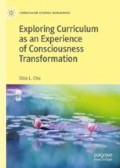Abstract
This chapter explores the deeds component (method-side) of spiritual practices for overcoming the dualistic worldview by means of drawing on the practices of the six perfections. Firstly, this chapter explores the order and interrelationships of the six perfections for embodying a non-dualistic worldview; it then explores the meanings, practices, and educational implications of the first four perfections. Finally, the embodiment of a non-dualistic worldview is understood through the concept of witnessing. Throughout this chapter, the dependently co-arising nature of self and world, the approach of negation, and the union of wisdom and method play crucial roles in clarifying significant concepts and practices.
Access this chapter
Tax calculation will be finalised at checkout
Purchases are for personal use only
References
Ahmed, S. (2010). The Promise of Happiness. Durham: Duke University Press.
Aoki, T. T. (2004). Layered Voices of Teaching: The Uncannily Correct and the Elusively True. In W. F. Pinar & R. L. Irwin (Eds.), Curriculum in a New Key: The Collected Works of Ted T. Aoki (pp. 187–197). New York, NY: Routledge. (Original work published 1992).
Boler, M. (1999). Feeling Power: Emotions and Education. New York, NY: Routledge.
Eppert, C. (2008). Fear, (Educational) Fictions of Character, and Buddhist Insights for an Arts-Based Witnessing Curriculum. In C. Eppert & H. Wang (Eds.), Cross-Cultural Studies in Curriculum (pp. 55–108). New York, NY: Routledge.
Huebner, D. E. (1999a). New Modes of Man’s Relationship to Man. In V. Hillis (Ed.), The Lure of the Transcendent: Collected Essays by Dwayne E. Huebner (pp. 74–93). New York, NY: Routledge. (Original work published 1963).
Huebner, D. E. (1999b). Practicing the Presence of God. In V. Hillis (Ed.), The Lure of the Transcendent: Collected Essays by Dwayne E. Huebner (pp. 388–395). New York, NY: Routledge. (Original work published 1987).
Kumar, A. (2013). Curriculum as Meditative Inquiry. New York, NY: Palgrave Macmillan.
Lusthaus, D. (2002). Buddhist Phenomenology: A Philosophical Investigation of Yogacara Buddhism and the Ch’eng Wei-shih Lun. New York, NY: RoutledgeCurzon.
Pinar, W. F. (1974). In the Stillness Is the Dance. In W. F. Pinar (Ed.), Heightened Consciousness, Cultural Revolution, and Curriculum Theory (pp. 1–15). The Proceedings of the Rochester Conference (Rochester, New York, May 3–5, 1973).
Riley-Taylor, E. (2002). Ecology, Spirituality, Education: Curriculum for Relational Knowing. New York: Peter Lang.
Simon, R. I., & Eppert, C. (1997). Remembering Obligation: Pedagogy and the Witnessing of Testimony of Historical Trauma. Canadian Journal of Education, 22(2), 175–191.
Smith, D. G. (2000). The Specific Challenges of Globalization for Teaching and Vice Versa. The Alberta Journal of Education Research, XLVI(1), 7–26.
Sopa, L. (2005). Steps on the Path to Enlightenment: A Commentary on Tsongkhapa’s Lamrim Chenmo. Volume II: Karma. Somerville, MA: Wisdom Publications.
Sopa, L. (2008). Steps on the Path to Enlightenment: A Commentary on Tsongkhapa’s Lamrim Chenmo. Volume III: The Way of the Bodhisattva. Somerville, MA: Wisdom Publications.
Thompson, E. (2007). Mind in Life: Biology, Phenomenology, and the Sciences of Mind. Cambridge, MA: Harvard University Press.
Tsong-kha-pa (2004). The Great Treatise on the Stages of the Path to Enlightenment (Vol. 2, The Lamrim Chenmo Translation Committee, trans.). Ithaca, NY: Snow Lion Publications. (Original work published 1402).
Author information
Authors and Affiliations
Rights and permissions
Copyright information
© 2019 The Author(s)
About this chapter
Cite this chapter
Chu, E.L. (2019). Learning to Embody a Non-Dualistic Worldview. In: Exploring Curriculum as an Experience of Consciousness Transformation. Curriculum Studies Worldwide. Palgrave Macmillan, Cham. https://doi.org/10.1007/978-3-030-17701-0_10
Download citation
DOI: https://doi.org/10.1007/978-3-030-17701-0_10
Published:
Publisher Name: Palgrave Macmillan, Cham
Print ISBN: 978-3-030-17700-3
Online ISBN: 978-3-030-17701-0
eBook Packages: EducationEducation (R0)

